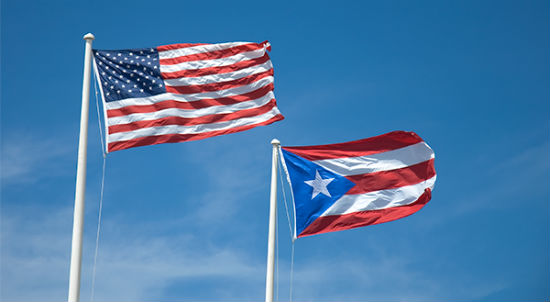The situation in Puerto Rico is very, very bad. Hurricane Maria devastated the island and it is running out of basic necessities.
Four days after a major hurricane battered Puerto Rico, leaving the entire island in a communications and power blackout, regions outside San Juan remained disconnected from the rest of the island — and the world. Juncos, in a mountainous region southeast of the capital that was slammed with Maria’s most powerful winds, remains isolated, alone, afraid.
For many residents, the challenge of accessing the essentials of modern life — gasoline, cash, food, water — began to sink in. And government officials had no answers for them. Estimates for the return of electricity and basic services will be measured not in days but in weeks and months. For those most vulnerable, far too long.
Many have been openly wondering when help will arrive, whether from local officials or from the federal government. The first thing some people ask when they see outsiders: “Are you FEMA?”
Puerto Rico Gov. Ricardo Rosselló is warning that his government needs broader assistance from the federal government, calling on the Pentagon especially to provide more aid for law enforcement and transportation. Rosselló said he’s also worried that Congress will shortchange his island once the initial wave of emergency relief is gone.
“We still need some more help. This is clearly a critical disaster in Puerto Rico,” he said Sunday night. “It can’t be minimized and we can’t start overlooking us now that the storm passed, because the danger lurks.”
Rescue, recovery and rebuilding in Puerto Rico would be a major challenge even if we had a capable government that was interested in the task of governing — one that saw itself as responsive and responsible to all of the people of America. But we do not have such a government.
Puerto Rico is home to more than 3 million American citizens, but despite that legal, constitutional status, residents of the territory have never been treated as equals to those on the mainland, even in the best of times. And these are not the best of times. We have a white nationalist president whose “America First” motto explicitly diminishes the citizenship and humanity of nonwhite citizens — particularly of Spanish-speaking American citizens like the residents of Puerto Rico. The Trump Effect can be seen on social media, where every post pleading for the swift, proportionate assistance Puerto Rico needs right now prompts dismissive MAGA sloganeering based on the ignorant (at best) claim that Puerto Ricans are not real Americans and that assistance for those “here in America” should take priority over any afterthought of crumbs for those in the colonial territory.

Massive natural disasters do not require a “hot take.” They don’t require a “take” of any kind. Joe Romm and Joy-Ann Reid both make a compelling case that Maria’s destruction in Puerto Rico is shaping up to be “Trump’s Katrina.” The president’s belated, begrudging response has revealed him to be unconcerned and incompetent — unable to rise to the kind of leadership that this crisis requires.
But then we already knew that about Donald Trump.
Compounding the current crisis on the island, and barring any hope of near-term recovery, is Puerto Rico’s current debt crisis. It’s twisted, but Wikipedia provides a helpful overview. The territory owes, and is unable to repay, more than $70 billion. That odious debt has begun to be restructured, with a kind of bankruptcy arrangement, but it all imposes a stifling austerity on the island. The logic guiding all of this has been the contradictory moralistic nonsense that seems to guide all discussion of non-corporate bankruptcy — the claim that creditors have a moral right to profit from the risk of lending, and also a moral right to lend without risk.
That Wikipedia article attributes Puerto Rico’s debt to “decades of mismanagement” — implying the territory’s government has always practiced a form of full sovereignty that it has never been allowed to enjoy. I would say that, yes, Puerto Rico has been “mismanaged” for decades, but that the source of that mismanagement has mostly been Washington in service of Wall Street rather than San Juan in service of its people.
Assigning blame for that debt, though, is a pointless exercise now. There was some debate last year during the PROMESA negotiations as to whether Puerto Rico might ever be capable of repaying that debt — whether the billions might, over time, be carved out of the island’s schools and streets and hospitals and transferred back to Wall Street. Most thought then that it could never be repaid, but a few disagreed. No one can disagree now. Any possibility of Puerto Rico’s bondholders one day profiting from those debts was washed away in the hurricane.
So it’s time for Jubilee. Cancel the debt. Erase it from the books.
What about those creditors? Don’t they deserve to be repaid? Well, I have bad news for them. There was a hurricane. A big one. An act of God. Their investment just got blown away. That’s always a possibility and, unfortunately for them, it just happened.
Of course, that’s just the practical, pragmatic argument for debt cancellation — based, in this case, on the sheer fact of the recent storm. But the essential idea of Jubilee is more than that. Jubilee says that while, yes, creditors have a claim to repayment, debt must never be perpetual and permanent. A creditor’s claim of perpetual obligation is illegitimate. It is untrue, unreal. A lie. There is a limit on how much can be squeezed, forever, from the indebted.
Jubilee is what’s needed now. But whether or not you believe in the moral or theological case for it, Jubilee is what’s needed now because there no longer exists any real alternative.
“And he rolled up the scroll, gave it back to the attendant, and sat down.”












